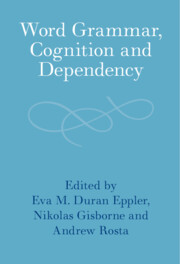Book contents
- Word Grammar, Cognition and Dependency
- Word Grammar, Cognition and Dependency
- Copyright page
- Dedication
- Contents
- Figures
- Tables
- List of Contributors
- Acknowledgements
- Introduction
- 1 Word Grammar in Its Intellectual Contexts
- 2 Raising in Phonology
- 3 Grammar Change in the Network
- 4 Word Formation Change in Word Grammar
- 5 The Metaphorical Bases of Constituency and Dependency
- 6 From Social Psychology to Cognitive Sociolinguistics
- 7 Hudson on Heads
- 8 Ordinary French Houses
- 9 Dependency Grammar and Subordination
- 10 Verb Phrases as Attributive Nominal Modifiers
- 11 Testing the Predictions of Word Grammar, the Minimalist Programme and the Matrix Language Frame Model for German/English Mixed Determiner–Noun Constructions
- 12 Factors Influencing Dependency Distance
- Index
- References
4 - Word Formation Change in Word Grammar
Two Case Studies
Published online by Cambridge University Press: 19 December 2024
- Word Grammar, Cognition and Dependency
- Word Grammar, Cognition and Dependency
- Copyright page
- Dedication
- Contents
- Figures
- Tables
- List of Contributors
- Acknowledgements
- Introduction
- 1 Word Grammar in Its Intellectual Contexts
- 2 Raising in Phonology
- 3 Grammar Change in the Network
- 4 Word Formation Change in Word Grammar
- 5 The Metaphorical Bases of Constituency and Dependency
- 6 From Social Psychology to Cognitive Sociolinguistics
- 7 Hudson on Heads
- 8 Ordinary French Houses
- 9 Dependency Grammar and Subordination
- 10 Verb Phrases as Attributive Nominal Modifiers
- 11 Testing the Predictions of Word Grammar, the Minimalist Programme and the Matrix Language Frame Model for German/English Mixed Determiner–Noun Constructions
- 12 Factors Influencing Dependency Distance
- Index
- References
Summary
This chapter provides a further contribution to work on Word Grammar and language change. It explores particular developments in English derivational morphology in order to look in more detail at what kinds of changes occur in the language network over time. This relates to discussions in other cognitive linguistic theories about diachronic variation in the language network, especially in terms of changes to nodes and changes to links between nodes. The main claims that are made are as follows: (i) much change in the network is very local and involves micro-steps, but (ii) some changes can occur which involve more significant restructuring, for instance where language users have reanalysed a part of a word as a word in itself. Since the central goal of Word Grammar is to understand the grammar of words, such changes can be revealing in terms of the theoretical underpinnings of the framework.
- Type
- Chapter
- Information
- Word Grammar, Cognition and Dependency , pp. 104 - 125Publisher: Cambridge University PressPrint publication year: 2025

